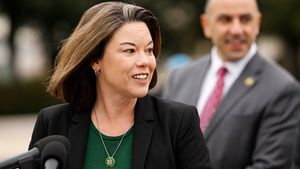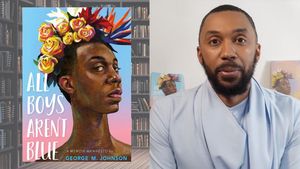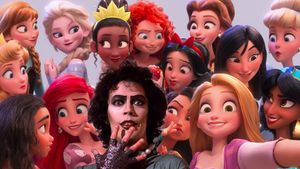“If it's been a long time since I've written a song, I have this really pervasive unease. It's a pressure that builds up.”
Well, finally, What a Relief.
Katie Gavin, the front woman of pop band MUNA, just released her debut solo album — but it’s not quite the anthemic synth-pop bangers her voice has become synonymous with. What a Relief tracks something grittier, folkier, more personal. “Lilith Fair-core,” as Gavin calls it.
Just ahead of the record's release, Out caught up with Gavin for a chat over Zoom. It’s hot in Los Angeles, but she’s sitting outside, surrounded by trees. She pauses a few times to placate her cat pawing at the window. There’s an ease around her.
When MUNA debuted back in 2016, they felt like a glitch. Their openness surrounding the queerness of all three members was unheard of, yet it became the band’s superpower. Eight years later, Gavin, Josette Maskin, and Naomi McPherson have inspired millions of people — fans and fellow musicians — around the world. They opened for Taylor Swift Eras tour. They reclaimed Coachella as “Dykechella.” They’ve crafted several certifiable gay anthems (“I Know A Place” and “Silf Chiffon” for starters). And the through line between their music and the two explicitly sapphic songs that made it to the Top 10 of the Billboard Hot 100 this year (Billie Eilish’s “Lunch” and Chappell Roan’s “Good Luck, Babe”) cannot be ignored.
“It's about fucking time” queer women see this success, says Gavin, and being “excited for each other and protective of each other” is a huge step forward. “Queer people, and especially people who are of a marginalized gender identity, have stories to tell. And we make amazing art.” Gavin is pointing out the obvious, but why does it still feel like something to prove?
Regardless, this progress is “really good to see, especially when looking at what women who've come before us in the industry were put through and how they were pinned against each other.”
 Alexa Viscius
Alexa Viscius
Alongside MUNA, Gavin stood in for Roan at All Things Go music festival in September after she backed out to address mental health concerns. The band’s cover of “Good Luck, Babe!” felt like a love letter to Roan, and Gavin was pleasantly surprised to see Roan’s fans showing them so much love.
“I take that as such a high compliment because I really love her art. The fact that we have crossover and the people that fuck with her also fuck with what we're doing, that kind of tells me that we're doing something right. She knows that I will do whatever I can to support her, and that just felt like a moment where we could make good on that.”
Roan’s unprecedented rise to fame concerns Gavin. “[MUNA] have had time to grow as artists. If our career took off at the rate that it's taken off for her, I would not have made it. I would not still be in this line of work, probably. We got to use the gift that we've been at this point, which is we've had time to grow.”
The pop landscape has grown so much, and so has Gavin. If MUNA songs are a pent-up release, What a Relief is the diary entry beforehand. Surprisingly, the writing process between this album and MUNA’s weren’t that different.
“It initially started off just being songs that we didn't want to work on for MUNA,” shares Gavin. “But I still liked the songs. Over time, I realized that maybe I had a record.”
Though the songwriting spans over seven years, the album doesn’t feel like a hodgepodge of tracks but rather, soft revelations over plucked guitar. As you listen through the record, you might find yourself saying, “This is the most beautiful song I’ve ever heard,” then it’ll happen again, and again, and again.
“As Good as It Gets” was one of those moments, a track featuring the one and only Mitski.
“I can't believe that she's the feature on this album,” reflects Gavin. “The stuff of dreams.” She sent the song to Mitski under the advice of her “A&R person” Phoebe Bridgers. It’s appropriately wistful yet gut-wrenching for a Mitski feature, playing out as a duet where two partners face the mundane reality of long-term intimacy.
“When I wrote it, I thought I was writing a love song,” she shares. “A lot of people that hear it perceive it as a breakup song. They're like, ‘Well, you shouldn't be in that relationship if this is how you're feeling.’ But other people also feel that it's a love song. I think it's cool to find that particular point and be like, where are y'all at? What can we expect from romantic relationships in our lives? Is this actually what I should be aiming for or is this a sign that if I’m feeling this way, I’m missing something?”
Songs about the highs and lows of love are scattered across MUNA’s catalog, but today, Gavin seems more content with feeling something more in the middle.
“I don't know if the type of love that is all-consuming, I don't know if that's meant for me,” she says with a smile. “I might actually be good on that at this point. It ruins your life.”
Then there’s the penultimate song on the album, “Keep Walking.” She wrote the song in 2020, “years and years after a relationship that had left me really shaken.”
“For a while,” Gavin reflects, “I needed to make that person a villain so that I could get away and distance myself. And then I got to a point where I realized, oh, I don't need these stories anymore. This was just a person who honestly, I want the best for. I want them to heal just like I want healing. I want everything for them that I would want for myself.”
But, she laughs, “That doesn't mean I should text them.”
The lyrics play out like the final scene of a bittersweet 2000s rom-com. Two old lovers stroll down a busy street. Their eyes meet, but no, it’s not a fateful reconnection. They’ve moved on, and they both silently make the decision to just keep on walking.
“Sometimes the best we can do with people is be like, I love you and I want the best for you, but in this life and in these incarnations, we should not be talking. It's just, we can't do it.”
 Alexa Viscius
Alexa Viscius
“Sparrow” is another devastating track, written from the perspective of a girl losing a lover while it’s actually about “climate derangement.”
The clever lyrics root the rapidly changing climate “in the very real heartbreak that is going to happen as the physical evidence of the damage that we've done to the world around us kind of becomes more and more real.”
The song’s central character is “losing a relationship that wasn't coming back,” says Gavin. “This metaphor of, I know that my girl's going to come back when the birds come back in the spring, and then when they don't come back…”
The metaphor came to her after reading Silent Spring by environmentalist Rachel Carson. “It's hard to really understand that the effects of climate disaster are going to be heartbreak, and it already has been for so many people losing loved ones, losing access to their homes. It is very real heartbreak. So I just wanted to find a way of telling that in a story song.”
This might not be the record for you if you’re expecting MUNA’s signature dance-cry hymns, but What a Relief easily slides in with the sounds of Boygenius and Hozier, Maggie Rogers and Lizzy McAlpine.
“I have a very foundational relationship to this style of music, like singer-songwriter, folkier music,” Gavin explains. “The process was kind of natural and easy, versus developing MUNA’s sound was very experimental and took some time. It felt like I was going into more uncharted waters. This kind of more just like a return to roots.”
Yes, there are a lot of sad songs, but Gavin hopes “people find some lightness” and “levity on the album. Even though I know I tend to write pretty heavy songs.”
The album title, What a Relief, is funny, she says. “It was a little bit of a cheeky nod. I am 31, almost 32, and I'm putting out my debut solo record now. So it was kind of just like, what a relief, I got it in.”
Gavin is currently gearing up for her solo tour around North America this November and December, then she’s “getting my ass back in the studio and locking in for MUNA 4.”
So not all hope is lost! Were you worried? Leaving the band behind was never in the cards.
“It feels good to be so hungry to get back to that project. It feels very, I don't know, nostalgic in a way.”

What A Relief is available wherever you stream music.


































 Alexa Viscius
Alexa Viscius Alexa Viscius
Alexa Viscius























